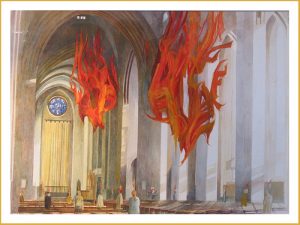Lectionary Reflection for Pentecost 2012
May 27, 2012
And at this sound the crowd gathered and was bewildered, because each one heard them speaking in the native language of each. —Acts 2:6
Read this week’s lesson from Acts carefully. I know. Yes, you’ve read it many times before. You know the story. Just humor me. Take another pass at the story and let yourself be transported back to the first century. Imagine you are in Jerusalem in that place with Peter and the others. It’s a busy time, a festival, so faithful Jews from all across the empire have converged on Jerusalem. Perhaps you, too, have traveled there from afar and speak a different language. You are hungry to be a part of this new thing, to hear the latest news from the disciples of Jesus.
 Suddenly the wind of the Holy Spirit fills the space. You hear the roar as it rushes through the place. What else do you hear? What do you see? What do you smell? What do you feel? Everything is crazy. People come running to see what is happening. A cacophony erupts — excited voices speaking in many tongues. Then an amazed silence blankets the room. The disciples begin speaking, and it’s amazing because everyone hears it in his or her own language! You, too, hear the message plainly, and you are amazed. Their words make perfect sense. Is it a miracle or is it drunkenness? Is it a holy happening and the realization of prophecy?
Suddenly the wind of the Holy Spirit fills the space. You hear the roar as it rushes through the place. What else do you hear? What do you see? What do you smell? What do you feel? Everything is crazy. People come running to see what is happening. A cacophony erupts — excited voices speaking in many tongues. Then an amazed silence blankets the room. The disciples begin speaking, and it’s amazing because everyone hears it in his or her own language! You, too, hear the message plainly, and you are amazed. Their words make perfect sense. Is it a miracle or is it drunkenness? Is it a holy happening and the realization of prophecy?
Yes, it is holy, but it is also a remarkable expression of God’s wholly encompassing, holy love for all humankind. People heard the good news in many languages, but the common language was love.
Fast forward to 2012 and back to reality. What languages are spoken in your community of faith? What message are people hearing? How do you hear the good news? Most importantly, is the language of love infused in every song, every sermon, every handshake and hug? Is love woven into the fibers of ministry and the mission of all disciples? Is love the last word in all you say and do in the name of Jesus?
According to the Barna Group, 51% of regular churchgoers say their lives have been somewhat or greatly changed by attending church, but 46% say their lives have not changed as a result of attending church. It makes one wonder what language the 46% of folks in the pews are hearing. How can one hear about the wondrous love and grace of Jesus and not be transformed by it? What gets lost in translation?
I know I’m asking a lot of questions, but it is important for us to re-imagine Pentecost for this day and for our time. Sure, we recognize it as the birthday of the early church, but the Holy Spirit didn’t remain in Jerusalem. The message was not just for that group of folks. Indeed, the gospel is still spreading and is spoken and proclaimed in many languages. The Holy Spirit still blows in faster than a summer rain squall and drenches God’s people in possibility and hope. It’s the same Spirit–timeless yet totally today.
 This Sunday consider how the language of faith is spoken in your context. Is the Spirit pouring over the people in a mighty rush of renewal and reformation? Is the church equipped to translate the message in an increasingly pluralistic world? Are you multilingual in a way that spans the generations, that taps into tweets, and blogs, and social networking? Can you communicate the story in images that are visually appealing and relevant?
This Sunday consider how the language of faith is spoken in your context. Is the Spirit pouring over the people in a mighty rush of renewal and reformation? Is the church equipped to translate the message in an increasingly pluralistic world? Are you multilingual in a way that spans the generations, that taps into tweets, and blogs, and social networking? Can you communicate the story in images that are visually appealing and relevant?
Consider how the good news might be heard by the single parent without a job and carrying a heavy load of worry. Think about what the body-pierced teenager is or is not hearing as she sits uncomfortably in the pew under parental duress. What about the retired couple who has watched their church change radically over the years? What does the Pentecost message mean to them this year? Yes, dear faithful ones, our church requires a facility with language that goes far beyond Greek, Hebrew, or any modern second language. We must be fluent in the languages of faith and love as well.
Don’t let Pentecost just be another date on the liturgical calendar, a festival day where red clothing, paraments, and flowers are the big deal. The Spirit is present and accounted for, so let that mighty wind wash over you and all God’s people. Let the Spirit whisper in your ear in the language you most need to hear, and trust that same Spirit to give you the words you need to speak to those assembled. May you be awakened to the divine will for community in which you serve and live. My prayer for you is the gift of fresh, bold faithful words spoken in love and carried on the wind of that wonderful advocate and Spirit of God.
With Children
Wind Power: Gather several fans ranging in size from a small hand-held personal fan to a box fan to a high-power shop fan. Be sure to take good safety precautions. Talk to the children about the lesson from acts and the mighty wind of the Spirit coming down from heaven. Turn on the smallest fan. Ask the children if it makes a mighty wind. Turn on the next smallest fan and ask the same question. Finally turn on the shop fan and ask them if this is a mighty wind. Connect the idea of the mighty wind with the excitement of the gift of the Spirit and tell them the next time they are outside in the wind to rest assured that the Spirit is with them.
Photos by Denise Krebs, Martin Beek, and Brayden McLean used under Creative Commons License. Thanks!




Nicely said, Sharon! Thank you for sharing your thought-provoking, faith-revitalizing words. May many hear anew and believe.
Thanks, Pastor Davidson! Blessings on your ministry and faith journey. God is good all the time!